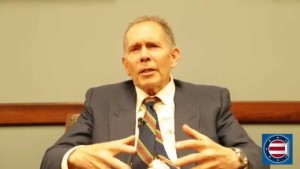by Herbert W. Titus and William J. Olson; June 26, 2015
 |
There is simply no other way to say it.
The Supreme Court’s decision today redefining marriage to include couples of the same sex is wholly illegitimate and unlawful. A nullity. Worthy only to be disobeyed. |
Anyone who says otherwise — that the rule of law requires recognition of same-sex marriage — is committing a fraud. And any State official — like Governor Robert Bentley of Alabama — who says that his oath of office requires unconditional obedience to the Supreme Court’s mandate to issue same-sex couples licenses to marry is mistaking his oath to the Constitution as if it were an oath of absolute obedience to five justices who happen to be sitting on the nation’s highest court.
As Chief Justice Roberts in dissent has described the action taken today:
“Five lawyers have closed debate and enacted their own vision of marriage as a matter of constitutional law. Stealing this issue from the people ….”
And just who are these lawyers? Justice Scalia reminds us that they are all educated at either Harvard or Yale, from the east- and west- coasts, not from the vast middle of the country, and not a single one an evangelical Christian or a Protestant, and then observes:
“The strikingly unrepresentative character of the body voting on today’s upheaval would be irrelevant if they were functioning as judges, answering the legal question whether the American people had ever ratified a constitutional provision that was understood to proscribe the traditional definition of marriage.”
Indeed, from the outset of his bare majority decision, Justice Kennedy did not even act like a judge. Rather, he wrote as if he were an existentialist philosopher seeking the meaning of life, as if the “liberty” protected in the Constitution was a personal quest “to define and express [one’s personal] identity.”
But the Constitution is not some philosophical work written by Jean Paul Sartre. Rather, it is a political and legal document designed by America’s founders to secure the unchanging God-given rights to life, liberty, and property which are deeply rooted in the 18th century soil of the nation. Justice Kennedy showed no regard for these fixed principles, opting for an evolutionary approach to law — asserting that the existential definition of marriage changes with changing times.
However, the very purpose of our Constitution is, as Chief Justice John Marshall wrote in Marbury v. Madison, to make “permanent” those principles that the people desired. And, so that those principles would not be “mistaken or forgotten,” the people committed them to writing. Thus, Marshall wrote “it is the province and duty for the courts to say what the law is,” not to make it up as we go along.
As today’s dissenting Chief Justice observed, “[t]hose who founded our country would not recognize the majority’s conception of the judicial role”:
“They after all risked their lives and fortunes for the precious right to govern themselves. They would have never imagined yielding that right on a social policy to unaccountable and unelected judges. And they certainly would not have been satisfied by a system of empowering judges to override policy judgments so long as they do so after ‘a quite extensive discussion.’”
And, as the capstone of his dissent, the Chief Justice concluded: “the Constitution. It had nothing to do with it.” In those nine simple words, Chief Justice Roberts explained why this decision of the Court is not law. If the Constitution had nothing to do with it, the Court had no jurisdiction to issue it. It is, therefore, a nullity.
In the words of Justice Felix Frankfurter, a brilliant jurist who understood the dangers of hubris on the highest court in the land — may Obergefell v. Hodges prove to be a “derelict on the waters of the law.” And it will be — but only if the American people rise up and resist this gross perversion of the rule of law.
Approximately one month ago, the U.S. Justice Foundation began to organize the writing and publication of a series of articles in a series entitled “Building the Resistance to Same-Sex Marriage.” This project was undertaken in the hope that the Supreme Court would not recklessly decide the same-sex marriage case, but nonetheless, we prepared for the worst, and sadly, the Supreme Court has disappointed us again. Hopefully over the coming weeks and months, state and local government officials and the people at large will be able to draw from these articles justification and techniques to resist the Supreme Court’s lawless decision.
In Article II, we established that the Fourteenth Amendment in no way addressed the issue of same-sex marriage. In Article III, Robert Reilly explained how poorly these cases have been litigated by government lawyers supposedly defending same-sex marriage. In Article IV, Pastor James Taylor explained the biblical and moral basis for traditional marriage. In Article V, Houston attorney J. Mark Brewer anticipated how courts will manipulate today’s rulings to penalize those in business and the professions who embrace biblical marriage. In Article VI, former Congressman John Hostettler explained that if a soldier has the duty to disobey an unlawful order, how could a state official not have that same duty? In Article VII, former federal magistrate Joe Miller discussed why it would be a violation of federal law and judicial ethics for Justices Ginsburg and Kagan to participate in the decision, yet both did so today.
In Article VIII, Pastor Matthew Trewhella provided a historical context for Christian resistance by lower government officials to illegal actions by higher government officials, known as “The Doctrine of the Lesser Magistrate.” In Article IX, we discussed the apparent efforts of the Supreme Court to bury the motion for recusal filed by the Foundation for Moral Law so that Justices Ginsburg and Kagan could more easily disregard their duty. In Article X, constitutional attorney Edwin Vieira explained how decisions like today’s decision violate the Constitution’s “good behavior” standard, leaving them susceptible to removal. In Article XI, former U.S. attorney Tom Ashcraft laid out the process by which Congress can limit the jurisdiction of federal courts, using the power Congress was expressly given in the U.S. Constitution. In Article XII, Senior Virginia Delegate Robert G. Marshall discussed how Congress could immediately use the Appropriations Power to prevent implementation of an unlawful decision such as that issued today. And lastly, in Article XIII, former Oklahoma Representative Charles Key described the responsibility and duty of every citizen, when serving on a jury, to decide both the facts and the law in every case, known as jury nullification.
This series of articles has demonstrated that a Supreme Court decision mandating same-sex marriage would be illegitimate. As Blackstone said, it would not just be bad law; it would be no law at all. That decision has now transpired. These articles also demonstrate that the American people and our elected officials have many ways to resist the unconstitutional decision of the Court. The question now is, will our political leaders abandon the true Constitution to embrace the decision of the Court?
In the coming days we will continue to be releasing articles further discussing the justification for and techniques that can be used by Congress, state officials, and the American people to resist today’s unlawful decision. We urge supporters of traditional marriage to view today’s loss as a setback, but by no means a final decision of anything. The battle continues.
Herbert W. Titus taught Constitutional Law for 26 years, and concluded his academic career as the Founding Dean of Regent Law School. William J. Olson served in three positions in the Reagan Administration. Together they have filed over 80 briefs in the U.S. Supreme Court, and dozens more in lower courts, addressing important public policy issues. They now practice law together at William J. Olson, P.C. They can be reached at traditionalmarriage [at] lawandfreedom [dot] com or twitter.com/Olsonlaw.








